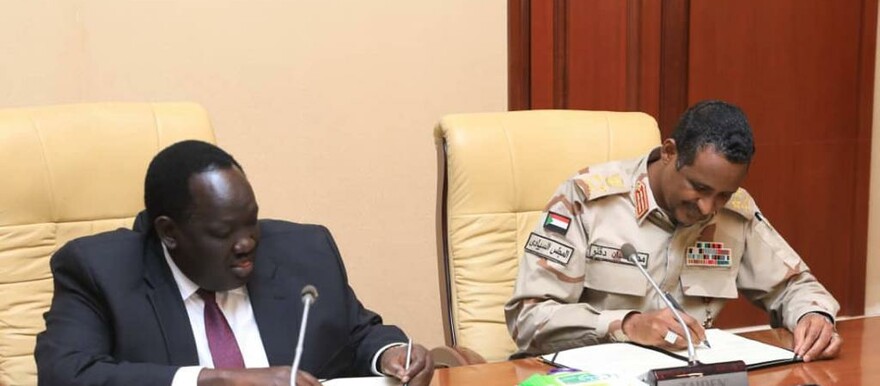Sudanese and South Sudanese officials have on Monday agreed to strengthen cooperation between the two countries by reactivating the joint mechanisms regarding the final status of the disputed Abyei region.
The deputy head of the Sudan Sovereign Council, Mohammed Hamdan Dagalo, signed the agreement on behalf of the Sudanese government while security advisor Tut Gatluak signed the document on behalf of South Sudan’s government.
The two officials stressed the need to expedite the joint mechanism and facilitate the provision of peace, security, and humanitarian services to the people in the area.
Addressing the media shortly after the signing ceremony in Khartoum Monday evening, Ambassador Dafallah Al Hajj Ali, the undersecretary at Sudan’s foreign ministry, said the two sides agreed to enhance joint cooperation and address outstanding issues on Abyei’s final status.
“The parties resolved to jointly expedite the provision of services to the citizens of Abyei and activate joint mechanisms to provide the necessary humanitarian services and create an appropriate environment for the communities in the region,” he said. “The two sides agreed to encourage social peace and community dialogue among different communities in Abyei as a gesture of trust building.”
Ambassador Al Haj noted that the two parties agreed on how to strengthen bilateral development between the two governments and develop ways that serve the interest of both sides.
Speaking at the same press briefing, Dr. Luka Biong, a member of the South Sudan delegation, said that the two parties agreed to develop a road map to find effective solutions to the situation in the Abyei region.
Biong, who hails from the disputed region expressed the need for the provision of services, including security that would facilitate the voluntary return of the citizens of Abyei.
“The final status of the Abyei region depends primarily on the previous references and agreements and this is very important as we are looking for a final solution over the area,” he said. “As the two countries are looking for a final solution for the region, services and security should be provided in the area.”
Dr. Biong said he hoped that Abyei becomes the link that strengthens ties between Sudan and South Sudan governments and the border communities in the two countries.
Since the independence of Southern Sudan in 2011, both South Sudan and Sudan have laid claim to the Abyei area which is mostly inhabited by the Dinka Ngok. The Sudanese Misseriya nomads travel to the area seasonally to graze their livestock.
The UN Security Council established a peacekeeping force, the United Nations Interim Security Force for Abyei (UNISFA) in 2011, to check violence and escalating tensions. The UNISFA is authorized to use force in protecting civilians and humanitarian workers in Abyei.




